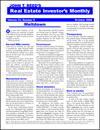John T. Reed’s review of Sidney Pashkow and Victoria Jackson's book
Focusing on Foreclosures


This review originally appeared in Real Estate investor’s Monthly.
Focusing on Foreclosures by Sidney A. Pashkow and Victoria A. Jackson
I have often noted that the vast majority of real estate investment information comes from California authors. So I was glad to receive a booklet on foreclosures from New Jersey authors: Focusing on Foreclosures… by Sidney A. Pashkow and Victoria A. Jackson.
Ethics of foreclosures
The book starts on an ethical note. It explains why foreclosures are good for all concerned (once one gets past the unrealistic notion that the borrower would like to stay in the home without paying) and says, "Do not read this book looking for ways to scam defendants [defaulting borrowers] in foreclosure."
In NJ and many other non-CA states, a foreclosure is a judicial action with a plaintiff (lender) and a defendant (defaulting borrower). The auction is conducted by the sheriff. This is in contrast to trust deed states where a private trustee auctions the property on behalf of the beneficiary (lender).
Prefer pre-foreclosures
The authors prefer pre-foreclosures and say they are "the most successful and practical way" to invest in foreclosures. This is a phenomenon I call "The grass is always inedible on the other side of the fence" syndrome. That is, the propensity of persons in one business to believe that other businesses are less desirable.
In fact, I have interviewed pre-foreclosure investors, foreclosure investors, and post-foreclosure (OREO and FHA/VA repo) investors. They all think their foreclosure niche is best. In fact, each has its advantages and disadvantages.
Advantages/disadvantages
One advantage of pre-foreclosures is that they are fresher, that is, properties that go to auction and/or are taken back by banks are more likely to be vacant and neglected—maybe vandalized. One disadvantage of pre-foreclosures for many is the moral discomfort inherent in persuading a down-on-their-luck couple to deed you their property for significantly less that it is worth. Pashkow said he was met by a shotgun once when he rang a pre-foreclosee's doorbell. They are usually beset upon by hordes of bargain seekers.
Example
The authors provide an example of a house the lenders think is worth $225,000 with a $150,000 first and a $50,000 second, both in default. The house is listed for sale at $190,000, but has generated no offers. They ask whether you would pay the sellers $5,000 in addition to bringing the loans at a cost of $20,000 current to buy? They recommend you not do that. I would think it's self-evident that you not pay $225,000 for a house that cannot draw an offer at $190,000.
Their example of a good deal is worth $150,000, has a $90,000 first that is $10,000 in arrears and a $2,000 second that is $2,000 in arrears. It also needs $2,000 of work. They recommend a purchase price of $102,000 for this property plus spending $2,000 to fix it up then selling for $130,000.


Why would someone be so stupid as to sell for $102,000 when the property is worth $150,000. Typically, they spend too much time in denial. Often, they are negotiating with a rich relative or friend and figure that will solve all their problems. When they cannot come to terms, it's too late.
Paskow and Jackson also recommend buying the delinquent mortgage at a discount from the lender. I investigated that once, but concluded that it was not a viable strategy. Loan officers are also in denial and reluctant to agree to such a stark admission of failure on their part. Private lenders are too savvy.
Costs
New Jersey sheriffs get a 3% commission plus their advertising fees for four weeks and the legal expenses of the lender's lawyer. In an example, the authors figure these expenses at $500 for the ads and $5,000 for the attorney.
Upset price
The upset price is the price above which you will not go at auction. The authors offer an example in which you buy a $90,000 first at a 50% discount or $45,000. That strikes me as unlikely. Anyway, in that case, they suggest an upset price of $75,000. Since you own the mortgage when you bid and will get the total bid given back to you, your true cost would be:
1st mortgage purchase $45,000
3% sheriff's comm.
$2,250 advertising costs $500
legal $5,000
Total $52,750
If you then sell for a quick-sale value of $130,000, your profit is $130,000 - $52,750 = $77,250. Pashkow and Jackson are experienced, so their ratios are presumably representative of the real world and therefore interesting: delinquent mtg discount 50% upset price/value ratio 50% quick sale/market value 87% legal/loan balance 6%
You get outbid
The authors also consider your getting outbid by a guy who pays $92,000. He get a $58,000 bargain compared to the $150,000 purchase price. You also make a profit because as the owner of the $90,000 foreclosing first, you receive $90,000 proceeds of the $92,000 auction price. After deducting $500 advertising and $5,000 legal, you would get $84,500 for a profit of $39,500 above your $45,000 cost.
I do not understand why the example investor sets such a low upset price. Seems to me you should have some standard upset ratio, like 75% of market value. Although you would hope to buy for $75,000, I do not think it's smart to let someone else get the property for $76,000. Such a person would make a $130,000 - $76,000 = $54,000 profit. You would make only $76,000 - $500 - $5,000 - $45,000 = $25,500. Why let them make so much? Every penny you bid up to the $90,000 face amount of the loan balance comes right back to you.
Try all three phases
You do not have to choose just one of the three phases of a foreclosure You can try to buy at all three on every property.
If the owner being foreclosed will not sell for your upset price or less, or has no equity, bid at the auction. If the auction price goes above your upset price, and the lender ends up being the high bidder, try to buy from the lender after the auction at your upset price or less.
Basically, you just bid up to your upset price at each of the three phases. If the borrower, auctioneer, or lender says yes to a price at or below your upset price, you buy the property. Otherwise, find another one.


Discount lien release
Don't forget to try to do a pre-foreclosure purchase from the lenders if the property has little or no equity. They may agree to release the lien from the property for less than face value. There is a chapter on that in my book How To Buy Real Estate for at Least 20% Below Market Value.
Postponements
Many foreclosure auctions are postponed. This tends to diminish the number of bidders when the auction finally occurs. It takes more effort to learn about postponed auctions than normally scheduled ones.
Cashiers checks
You need to take appropriate cashiers checks to the auction. In New Jersey, each county prescribes the deposit necessary to bid and win. In CA, you need the entire purchase price; in New Jersey, only 10% to 20%. You have to come up with the rest of the purchase price within 30 days. Pashkow and Jackson say to take several denominations of checks if your upset price is significantly higher than the minimum bid. The sheriff does not make change, so if you get it for less than your upset price, and bring a check for 10% of your upset price, your check will be unnecessarily big.
In NJ, the borrower has 10 days to redeem the property. To do so, he must pay all costs plus 6% to the winning bidder. As is typical elsewhere, he is not required to reimburse the winning bidder for any repairs or improvements. If there is an IRS lien on the property, it has a redemption period of 120 days. You should not spend any money on the property until all redemption periods have expired.
Can't trust lenders
The authors say you cannot trust the lenders to bid as they say they will. The only way to be sure is to attend the auction, prepared to bid up to your upset price.
Insurance
You must get hazard and liability insurance on the property immediately after purchasing it. But that's easier said than done if you do not occupy it. Insurers do not like to insure vacant property. Also, with foreclosures, there is a heightened risk of arson and vandalism from spiteful foreclosees.


Keep secret
In my book How to Buy Real Estate for at Least 20% Below Market Value, I have a subhead about the need for secrecy in each chapter. Pashkow and Jackson say you need to keep the foreclosure secret from neighbors of the property when making inquiries about the neighborhood. Neighbors know property values and will recognize a bargain. They often have friends or relatives interested in moving into the neighborhood. You also need to keep it secret from real estate agents.
Abandoned easiest
The authors say abandoned property is the easiest to buy, although they do not say why. I suspect they are referring to the eagerness of the owner to get rid of it. I figure it is the most difficult to buy in the sense of making a pre-purchase inspection. There is typically no electricity for checking appliances and climate control or even lights to see with. I once wrote an article about buying FHA repos and titled it "Investing by flashlight" because that was the only way to see inside boarded-up HUD houses.
Tax lien certificates
In New Jersey, they also have a type of distress sale known as a tax lien certificate for non-payment of property taxes. The maximum interest allowed on them is 18%. You bid lower and lower interest rates at the auction. Low bidder wins.
If you get the tax lien certificate, you generally will be paid off plus the winning bid interest rate. In rare cases, the owner will not pay. After two years, you can convert your certificate into a deed.
Security deposits
If you acquire a rental property with tenants in it, you will be responsible for reinstating their rent security deposits. So you have to bid lower to reflect that extra expense.
Getting answers
According to Pashkow and Jackson, those who have information you need—borrower, lender, sheriff, and so forth—are often unresponsive to your inquiries. To overcome that, the authors suggest a ploy.
Call the attorney for the bank and tell the secretary that you were told by a third party that a certain property is in foreclosure and that you were not informed formally of this action. This should spur them to answer your questions because it sounds like you may be a junior lienholder who was not notified as required by law.


I would not do this because it is misleading. You will be found out sooner or later, at which time you are even less likely to get cooperation with regard to your questions. Also, if you are planning on long-term pursuit of pre-foreclosures, you will have to deal with the same few attorneys over and over. Misleading them would likely start you off on the wrong foot. I suspect a better suggestion would be to walk into their offices. It's harder to be unhelpful face-to-face.